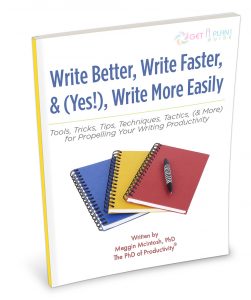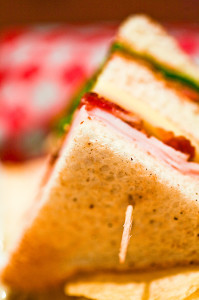Feed Your Inner Writer by Beverly Delidow
Those of you who write regularly know that it is wonderful, fulfilling and engaging, but it is also HARD WORK. And HARD WORK requires fuel, both for body and mind. Here are ten ways to feed the writer in you to keep both going.
Feed Your Writing Body: Food
I don’t know about you, but when my brain is engaged, my teeth like to come to the party, too. A working brain requires energy, so snacks are often a must, though that can pose some logistical problems. Here are five thoughts about feeding your inner writer:
-
Food for writing needs to be one-handed. You don’t want to stop. Sticks of things work well. This is even better if there is something to dip it in (but see #2). Pretzel sticks, carrot sticks, chips that are hearty enough not to crumble all over your stuff, cubes of cheese all work well. Sandwiches can work pretty well, too, as long as nothing falls out of them. (Sloppy Joes? I don’t think so!)
-
Food for writing must not drip! Papers will get smudged or sticky, gummy keyboards are a worse disaster. So overstuffed sandwiches, drippy dips, and salsas have to be saved for another time. Peanut butter and hummus are two of my favorites dips – they’re tasty and they cover another point (see #4).
-
Feed your hunger. Know whether you want salty, sweet, sour, or spicy, and feed that. If you feed a need you don’t have, you’ll just stay hungry. This distracts you from the writing, so feed your need and get back to work.
-
Have something nutritionally balanced. Protein is satisfying and lasts a long time; good fats (for the chemically-inclined, mono- and poly-unsaturates, no trans fat!) and fiber also help you feel satisfied. Peanut butter and hummus both have these qualities and can help you refocus even harder on your work. My favorite one-hand, don’t-want-to-stop writer snack is a carrot (Veggies! Fiber! Carotenes!) dipped or spread with peanut butter (Good fats! Protein! Sweet AND salty!) -YUM.
-
Two additional things are a must for me: Water and chocolate. Make sure to drink enough water. Sometimes we feel hunger, when it is actually water our bodies want. And I love CHOCOLATE – extra rich, very dark, heavy chocolate in small pieces. This is my special treat, that I can make last for five or ten minutes to savor it fully. Find what you love like that and have it on hand to celebrate your craft.
So now you’re no longer hungry, and that’s good. But to feed your inner writer, you also need to feed that hard working brain more than just nutrients – it needs some thought-fuel, too. Read on.
Feed Your Writing Mind: Reading
Writers are almost always readers – we wouldn’t do this if we didn’t think the printed page was a great thing. We often forget that what we feed our minds can also feed our craft. These are five kinds of works to find that will help you write:
-
Read for genre. Look for the best examples out there of the kind of book or article you want to write. If that’s fiction – read the best writers in your genre. If it’s nonfiction – read that. Figure out what it is about these that works for you. Think about how to bring out those qualities in your own work.
-
Read for inspiration. Revel in work by authors whose writing you admire – reading really good writing is inspiring and shows you how much can be done. Again, think about what they do that is different and how that could be applied in your own voice.
-
Read for joy. Find books that make you happy. While some truly wonderful works make us sad and thoughtful, there are others that lift us up and make us laugh and smile. It’s good to laugh and smile.
-
Read for thought. Read some books that make you think – engage your writing brain. Some books don’t necessarily make you feel good, but they make you think, they challenge you, and meeting that challenge can be very rewarding. How do you want to challenge your reader?
-
Read for contrast. Though this may sound odd, find books that are examples of what you do NOT want your writing to be like. As strange as this sounds, you need to know what you want to avoid, as well as what you want to include. There are certain things I learned that I really dislike in works of fiction and I don’t want my work to ever do that. Being aware of what you do as an author makes you a better writer.
With well-nourished mind and body, you can be set to write your best. So get busy – I’m looking for something to read!
© Beverly Delidow | delidow@marshall.edu
Beverly Delidow is a professor, writer, and photographer in West Virginia. She has published articles, fiction, poetry, and photographs in a number of forms.
 Whether you write for pleasure, to discover, to get paid, as a part of your work, as a way to instruct, or for any other purpose, streamlining your writing process is essential. The Get a Plan! Guide® to Writing Better, Faster, & (Yes!) More Easily: Tools, Tricks, Tips, Techniques, Tactics, & More for Propelling Your Writing Productivity.
Whether you write for pleasure, to discover, to get paid, as a part of your work, as a way to instruct, or for any other purpose, streamlining your writing process is essential. The Get a Plan! Guide® to Writing Better, Faster, & (Yes!) More Easily: Tools, Tricks, Tips, Techniques, Tactics, & More for Propelling Your Writing Productivity.
Inside this essential Get a Plan! Guide, you’ll find nearly 70 practical, easy-to-implement ideas that will propel your writing productivity.





